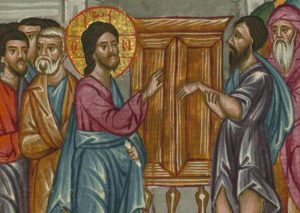HOMILY WEEK 23 01 – Year II
Attitudinal Healing
(1 Cor 5:1-8; Ps 5; Lk 6:6-11)
*******************************
Has the cryptic statement, “Check that attitude” ever applied to you?
The liturgy today invites us to be aware of and open to a transformation of attitudes, so we can help others heal in a similar way.
The Word Among Us offers us this reflection to consider: Critics play an important role in the music world. They help the public to evaluate what is good, and by doing so, they set standards for music. But critics can also be biased and closed to anything new or different. For example, one of Bach’s students called his music “turgid and confused.” A contemporary of Mozart called his music “overloaded and overstuffed.” One critic said of Beethoven’s Ninth Symphony, “It was hard to figure out what all the noise was about.”
 You could say some Pharisees of Jesus’ day had become like those critics. In their zeal to preserve the Law, they had attached their own limited expectations to it. One of those limitations was they taught curing the sick was forbidden on the Sabbath, unless the sick person was in danger of death. The man whom Jesus healed in the synagogue had only a withered hand, so that clearly didn’t qualify. These Pharisees weren’t willing to admit God could go beyond their assumptions of what the Law was all about.
You could say some Pharisees of Jesus’ day had become like those critics. In their zeal to preserve the Law, they had attached their own limited expectations to it. One of those limitations was they taught curing the sick was forbidden on the Sabbath, unless the sick person was in danger of death. The man whom Jesus healed in the synagogue had only a withered hand, so that clearly didn’t qualify. These Pharisees weren’t willing to admit God could go beyond their assumptions of what the Law was all about.
This attitude can affect us as well. We can view our own assumptions about God and life as being the only thing that matters, and end up limiting God as a result. But our heavenly Father wants to take us beyond our limited expectations, both of who God is and of who we can become. As Sr. Teresita Kambeitz OSU claims, “God accepts us as we are and believes in whom we can become.” God is not interested in healing us just enough so we can squeak our way into heaven. God want us to be living in that kingdom here and now, and in the end, fill us with so much love and grace we will joyfully dance our way through heaven’s gates, bringing countless people with us whose lives we have touched.
St. Paul, in his letter to the Corinthians, challenges them to look into their lives and the life of their community to see where they have to change to be more Christlike. For them, it meant to strongly discipline and try to correct someone who had strayed in the area of sexual immorality. Does that sound familiar to us today, given the recent disclosure of decades of sexual misconduct within the church and the likelihood it was covered up by those in authority? One friend shared with me his conviction the whole church needs to be put through the 12 Step program! Maybe he is right, and probably St. Paul would agree with him.
The psalm holds up to us the attitudes we should be enjoying and displaying to the world – a humble attitude of prayer and praise in response to the unconditional love of God for us. And Jesus in the gospel models for us an open attitude – although surrounded by crowds and with a full agenda of teaching them, he was able to single out and focus on the real need of one individual with a withered hand, and heal him.
Between the Corinthians on the one hand, and the Pharisees on the other, the invitation is extended for us to look into our own lives to see where we might need attitudinal healing. Personally, I recall giving an inspirational talk about relating to the poor to a local St. Vincent de Paul group, then leaving immediately to try to be on time for a planned group discussion. As I was leaving and earnestly trying to locate the address on my GPS, an obviously upset man snuck into the open church door and tried to engage me in a conversation about his common-law partner who was abusing him. I did everything I could to avoid getting involved in the matter, ended up making a joke to which he took offense, swore at me and stepped back into the church. I made my get-away and arrived actually early for that session, but now carrying some guilt.
I had just spoken about Christ to a group of church people, yet had put my agenda ahead of another person’s need to deal with an issue, and failed to see Christ in that person. I was the man with the withered hand needing to be healed, and also just like the Pharisees who had narrowed the Law down to their own needs and goals, sacrificing the law of love for the law of personal agenda. I needed to check my attitude!
The Eucharist is a great leveller – here we are all equal, prince or pauper, celebrity or unknown. This is also the place and the sacrament designed to both forgive us our failure to love, and to heal us of our attitudes preventing us from loving.
May our celebration deepen our faith in Jesus to forgive and heal, transform our attitudes into more Christ-like thinking and acting, and empower us to go out with a transformed attitude to reach out to other like Jesus.



